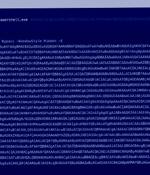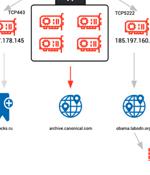Security News

The uBlackList browser extension lets you clean up search results by removing specific sites when searching on Google, DuckDuckGo, Bing, and other search engines. uBlackList is a browser extension for both Chromium and Firefox that allows you to input a list of websites you want to be blocked from search results.

The uBlackList browser extension lets you clean up search results by removing specific sites when searching on Google, DuckDuckGo, Bing, and other search engines. uBlackList is a browser extension for both Chromium and Firefox that allows you to input a list of websites you want to be blocked from search results.

The uBlackList browser extension lets you clean up search results by removing specific sites when searching on Google, DuckDuckGo, Bing, and other search engines. uBlackList is a browser extension for both Chromium and Firefox that allows you to input a list of websites you want to be blocked from search results.

ChromeLoader may seem on the surface like a run-of-the-mill browser hijacker that merely redirects victims to advertisement websites. ChromeLoader is a pervasive and persistent browser hijacker that eventually manifests as a browser extension, modifying victims' Chrome settings and redirecting user traffic to advertisement websites.

Hackers are showing an increased interest in the Windows Subsystem for Linux as an attack surface as they build new malware, the more advanced samples being suitable for espionage and downloading additional malicious modules. WSL-based malware samples discovered recently rely on open-source code that routes communication through the Telegram messaging service and gives the threat actor remote access to the compromised system.

Dubbed ChromeLoader, the malware is a "Pervasive and persistent browser hijacker that modifies its victims' browser settings and redirects user traffic to advertisement websites," Aedan Russell of Red Canary said in a new report. ChromeLoader is a rogue Chrome browser extension and is typically distributed in the form of ISO files via pay-per-install sites and baited social media posts that advertise QR codes to cracked video games and pirated movies.

Cybersecurity researchers are calling attention to a free-to-use browser automation framework that's being increasingly used by threat actors as part of their attack campaigns. The U.S. cybersecurity company said it observed command-and-control IP addresses associated with malware such as Bumblebee, BlackGuard, and RedLine Stealer establishing connections to the downloads subdomain of Bablosoft, the maker of the Browser Automation Studio.

The maintainers of the Tails project have issued a warning that the Tor Browser that's bundled with the operating system is unsafe to use for accessing or entering sensitive information. "We recommend that you stop using Tails until the release of 5.1 if you use Tor Browser for sensitive information," the project said in an advisory issued this week.

The ChromeLoader malware is seeing an uptick in detections this month, following a relatively stable volume since the start of the year, causing the browser hijack to become a widespread threat. ChromeLoader is a browser hijacker that can modify the victim's web browser settings to show search results that promote unwanted software, fake giveaways and surveys, and adult games and dating sites.
The privacy-focused DuckDuckGo browser purposely allows Microsoft trackers on third-party sites due to an agreement in their syndicated search content contract between the two companies. "Tracker Radar automatically blocks hidden third-party trackers we can find lurking on websites you visit in DuckDuckGo, which stops the companies behind those trackers from collecting and selling your data," explains the Apple App Store page for the DuckDuckGo Privacy Browser.